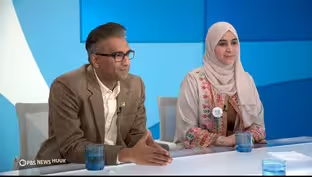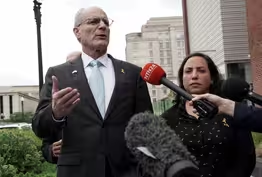
‘MAHA’ report targets vaccines, food and prescription drugs
Clip: 5/22/2025 | 8m 49sVideo has Closed Captions
Kennedy's ‘MAHA’ report targets vaccines, food supply and prescription drugs
President Trump and Health and Human Services Secretary Robert F. Kennedy Jr. released a report about the uptick in chronic childhood diseases and what they say are the underlying causes. The report from the "Make America Healthy Again" commission is in line with the ideas and beliefs that Kennedy has promoted. Ali Rogin discussed more with Lauren Weber of The Washington Post.
Problems playing video? | Closed Captioning Feedback
Problems playing video? | Closed Captioning Feedback
Major corporate funding for the PBS News Hour is provided by BDO, BNSF, Consumer Cellular, American Cruise Lines, and Raymond James. Funding for the PBS NewsHour Weekend is provided by...

‘MAHA’ report targets vaccines, food and prescription drugs
Clip: 5/22/2025 | 8m 49sVideo has Closed Captions
President Trump and Health and Human Services Secretary Robert F. Kennedy Jr. released a report about the uptick in chronic childhood diseases and what they say are the underlying causes. The report from the "Make America Healthy Again" commission is in line with the ideas and beliefs that Kennedy has promoted. Ali Rogin discussed more with Lauren Weber of The Washington Post.
Problems playing video? | Closed Captioning Feedback
How to Watch PBS News Hour
PBS News Hour is available to stream on pbs.org and the free PBS App, available on iPhone, Apple TV, Android TV, Android smartphones, Amazon Fire TV, Amazon Fire Tablet, Roku, Samsung Smart TV, and Vizio.
Providing Support for PBS.org
Learn Moreabout PBS online sponsorshipGEOFF BENNETT: President Trump and Health and Human Services Secretary Robert F. Kennedy, Jr. released a report today about the uptick in chronic childhood diseases and what they say are the underlying causes.
The report was issued by a panel of top administration officials who make up Kennedy's Make America Healthy Again Commission.
AMNA NAWAZ: The report is very much in line with the ideas and beliefs that Kennedy promoted before becoming HHS secretary, ones he argues should be the country's top public health priorities.
But it comes at a time of deep cuts to public health agencies by the administration's.
And many scientists and researchers say Kennedy is exaggerating or misleading what the data show about a number of his claims.
Ali Rogin has that story.
ROBERT F. KENNEDY JR., U.S. Health and Human Services Secretary: I'm honored to present you the MAHA Report.
ALI ROGIN: Today's report, officially known as the Making Our Children Healthy Again Assessment, outlined what Robert F. Kennedy called a nationwide crisis of childhood chronic disease.
ROBERT F. KENNEDY JR.: This is a milestone.
There's -- never in American history has the federal government taken a position on public health like this.
ALI ROGIN: The report identified four main culprits, poor diet, exposure to synthetic chemicals, lack of activity and chronic stress, and -- quote -- "overmedicalization" under the backdrop of what Kennedy calls undue influence from the food, drug, and chemical industries.
ROBERT F. KENNEDY JR.: It's common sense that ultra-processed, nutrient-poor food contributes to chronic disease.
It's common sense that excessive screen time and isolation lead to anxiety and depression, especially in children.
It's common sense that exercise and healthy food come before prescriptions and surgery.
ALI ROGIN: Among other proposals, it called for more rigorous clinical trials for vaccines, including placebo-controlled tests, which some experts call unethical when trials have already been done.
And it casts doubt on the childhood vaccine schedule, which has alarmed many public health experts.
The report also said children were spending too much time indoors, too often on devices, and that parents and providers are overreliant on prescription drugs.
And it linked ultra-processed foods to spikes in childhood obesity, diabetes, and other health conditions.
ROBERT F. KENNEDY JR.: This is the beginning of a conversation, a national conversation that we are going to have with maturity, with nuance for the first time in history.
ALI ROGIN: While many nutrition experts agree with Kennedy about concerns over American diets and the link to obesity, researchers have said Kennedy's broad claims attacking the use of medication for kids is not necessarily backed by clear data.
On the herbicide glyphosate, the report didn't go as far as the agriculture industry feared.
It cited studies showing possible health effects, but also warned against precipitous changes in agricultural practices.
ROBERT F. KENNEDY JR.: The whole wide world will come round.
ALI ROGIN: Today's report comes after President Trump tasked the health secretary with identifying key drivers of chronic disease in February.
But if today's report was the diagnosis, the recommended treatments are supposed to come in a strategy document laying out solutions by mid-August.
For a deeper dive on today's report, we now turn to Lauren Weber, health and science accountability reporter at The Washington Post.
Lauren, thank you so much for being here.
We have seen the report.
What are your observations?
Did anything surprise you in it?
LAUREN WEBER, Health and Science Accountability Reporter, The Washington Post: Well, as you noted, a lot of it followed what Kennedy has been saying for many months, including during his presidential run.
He has run on this idea and taken this position as HHS that childhood chronic disease is a huge issue that this country must tackle.
And a lot of the nutrition experts I spoke to were really heartened to see the report.
They felt it looked at ultra-processed food in a way that the United States has not.
But several of the other medical experts I spoke to were alarmed at some of the report's findings when it came to both vaccines and medications.
ALI ROGIN: So let's talk a little bit more about the extent to which the recommendations in this report and Kennedy's positions writ large fall outside the mainstream of scientific inquiry.
LAUREN WEBER: Well, Kennedy has been an anti-vaccine activist for 20 years.
So that certainly falls outside of mainstream medicine's feelings on vaccines.
And some of what the report reflects is many statements that he's said many times.
It talks a little bit about whether or not there are too many vaccines in the childhood vaccination schedule, casting doubt on that.
Many medical experts have said that's not something to worry about, that the vaccines are well-tested, they are safe, they are effective, and they currently are monitored in their totality currently.
ALI ROGIN: And, of course, this health and human services secretary is a little bit different, because most people coming into this position don't come with a movement behind them.
So what does that say about his ability to potentially change the status quo when it comes to health policy and also on public opinion?
LAUREN WEBER: He's really tapped into a lot of anger and populist movement around people feeling their kids are not getting the nutrition or the health that they need.
One of his allies said to me, and it's true.
When's the last time the majority of America knew who the HHS secretary is?
Usually, it's alphabet soup on the Hill.
So, I mean, I think he has a lot of power behind what he says.
ALI ROGIN: And one of the issues that the MAHA movement has been very vocal on is the issue of pesticides, herbicides.
This report does include some mention of the risks that have in the past been associated with herbicides like glyphosate, but it pulled some punches.
What's been the response there?
And why is that?
LAUREN WEBER: I think that's - - it's a really fascinating question because I think it exposes a lot of the tensions within Trump's own Cabinet.
I mean, RFK for years, RFK Jr. for years has pushed against pesticides.
And the report itself kind of -- it tiptoes around calling them very dangerous, but then it goes and says, look, American farmers are the best partners of the Trump administration.
So I think what you're seeing playing out there is some of the industry interests also playing into the report.
ALI ROGIN: And we have talked so far about what was in the report.
Were there any noticeable things to you that were not in the report?
LAUREN WEBER: I think it was really noticeable that the leading cause of death for children and teenagers is gun violence, and guns were not mentioned at all in the report.
ALI ROGIN: Why do you think that is?
It does seem there are a lot of issues that were not mentioned in this report that typically are part of the public health strategy of HHS.
LAUREN WEBER: I think this report really reflects Kennedy's vision for what America should be focusing on.
It didn't talk about smoking, which we have also seen cuts to folks that work in smoking prevention at the CDC.
It didn't talk about the cost, the high cost of health care.
It didn't talk about physician shortages across the country.
It kind of skirted away from those issues and stayed more in the MAHA corner.
And I think that reflects his perspective.
ALI ROGIN: Do you think MAHA supporters are going to be satisfied with this assessment?
What are they saying so far?
LAUREN WEBER: I think some are going to be really excited that they see this focus on this -- on these issues that they really care about.
Some are frustrated that on pesticides and even some on vaccines feel like they didn't go far enough.
ALI ROGIN: And what are we anticipating comes next?
They're due to put out another report laying out the prescriptions for these problems.
So what should we see?
LAUREN WEBER: I think that's the real question is, who wins out?
Is it Kennedy?
Is it other members of the Cabinet?
How will this play out when it comes to actual policy recommendations?
Are we going to see what we saw with pesticides, where there was a threat of more, but kind of got walked back, or will we see more sweeping change?
We will have to see.
ALI ROGIN: And, of course, there are some recommendations in terms of healthy foods that in some ways run counter to what's happening in other parts of the federal government that HHS doesn't have purview over.
USDA is cutting many of the funding streams to school lunches, for example, things that.
So how does that tension play out, where there may be some recommendations happening to increase the availability of healthy foods, produce, but the money may actually be going in a different direction?
LAUREN WEBER: I think that's one of the inherent contradictions of Kennedy as HHS secretary.
He often calls for things environmental exposures.
Well, the EPA has currently been rolling back some regulations when it comes to PFAS and other things.
So I think that's one of the things we will have to continue to watch.
As I noted, on smoking, there were cuts to the folks that actually prevent that.
So it's very curious to see how that will play out.
ALI ROGIN: Lauren Weber, health and science accountability reporter at The Washington Post, thank you so much.
LAUREN WEBER: Thanks for having me.
Georgetown scholar speaks for first time since ICE detention
Video has Closed Captions
Clip: 5/22/2025 | 9m 33s | Georgetown scholar and wife speak out for first time since his ICE detention (9m 33s)
Israeli embassy killings investigated as terrorism
Video has Closed Captions
Clip: 5/22/2025 | 3m 34s | Israeli embassy worker killings investigated as hate crime and terrorism (3m 34s)
'Stop delegitimizing us,' Israeli ambassador to U.S. says
Video has Closed Captions
Clip: 5/22/2025 | 7m 11s | 'Stop delegitimizing us,' Israeli ambassador to U.S. says after embassy worker killings (7m 11s)
Tapper and Thompson discuss book on Biden's signs of decline
Video has Closed Captions
Clip: 5/22/2025 | 9m 54s | Tapper and Thompson discuss book claiming Biden's inner circle hid signs of decline (9m 54s)
Trump's bill clears House, faces uncertain future in Senate
Video has Closed Captions
Clip: 5/22/2025 | 6m 29s | House GOP passes Trump's 'big, beautiful bill,' but it faces uncertain future in Senate (6m 29s)
Providing Support for PBS.org
Learn Moreabout PBS online sponsorship
- News and Public Affairs

FRONTLINE is investigative journalism that questions, explains and changes our world.

- News and Public Affairs

Amanpour and Company features conversations with leaders and decision makers.












Support for PBS provided by:
Major corporate funding for the PBS News Hour is provided by BDO, BNSF, Consumer Cellular, American Cruise Lines, and Raymond James. Funding for the PBS NewsHour Weekend is provided by...




